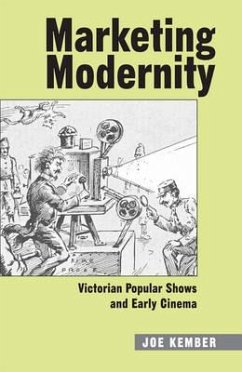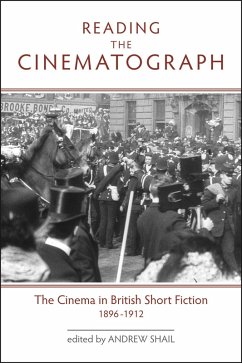
British Cinema and Middlebrow Culture in the Interwar Years (eBook, PDF)

PAYBACK Punkte
42 °P sammeln!
British Cinema and Middlebrow Culture in the Interwar Years offers an understanding of British Cinema between 1928 and 1939 through an analysis of the relationship between the British film industry and other 'culture industries' such as the radio, music recording, publishing and early television. This relationship has been seen as a weakness of the British film-making tradition, but Lawrence Napper stages a re-appraisal of that tradition, arguing that it is part of a specific strategy of differentiation from Hollywood cinema, designed to appeal to the 'middlebrow' aesthetic of the most rapidl...
British Cinema and Middlebrow Culture in the Interwar Years offers an understanding of British Cinema between 1928 and 1939 through an analysis of the relationship between the British film industry and other 'culture industries' such as the radio, music recording, publishing and early television.
This relationship has been seen as a weakness of the British film-making tradition, but Lawrence Napper stages a re-appraisal of that tradition, arguing that it is part of a specific strategy of differentiation from Hollywood cinema, designed to appeal to the 'middlebrow' aesthetic of the most rapidly expanding audience of the period-the lower middle class.
Lawrence Napper argues that the 'middlebrow' reputation for aesthetic conservatism masks an audience and popular culture marked by dynamism. 'Middlebrow' texts addressed a British audience on the move, physically (into the new suburbs), socially (as upwardly mobile consumers), economically (employed in new and developing industries, and involved in new modes of living), and culturally (embracing new forms of mass cultural consumption, such as the cinema, the wireless and the best-selling novel). The ability of these audiences to adapt cultures of the past to the media of modern life (through stage or screen adaptations) ensured their negative reputation amongst Modernist commentators and intellectual elites.
This relationship has been seen as a weakness of the British film-making tradition, but Lawrence Napper stages a re-appraisal of that tradition, arguing that it is part of a specific strategy of differentiation from Hollywood cinema, designed to appeal to the 'middlebrow' aesthetic of the most rapidly expanding audience of the period-the lower middle class.
Lawrence Napper argues that the 'middlebrow' reputation for aesthetic conservatism masks an audience and popular culture marked by dynamism. 'Middlebrow' texts addressed a British audience on the move, physically (into the new suburbs), socially (as upwardly mobile consumers), economically (employed in new and developing industries, and involved in new modes of living), and culturally (embracing new forms of mass cultural consumption, such as the cinema, the wireless and the best-selling novel). The ability of these audiences to adapt cultures of the past to the media of modern life (through stage or screen adaptations) ensured their negative reputation amongst Modernist commentators and intellectual elites.
Dieser Download kann aus rechtlichen Gründen nur mit Rechnungsadresse in A, D ausgeliefert werden.













